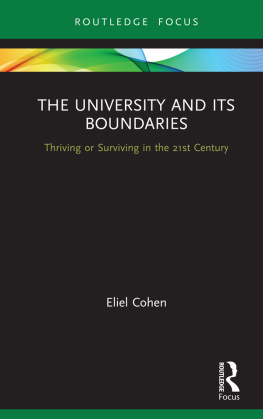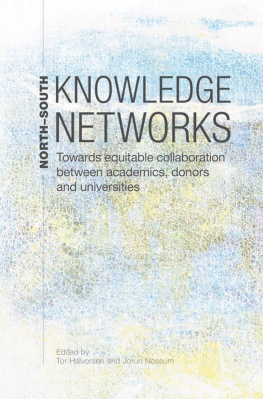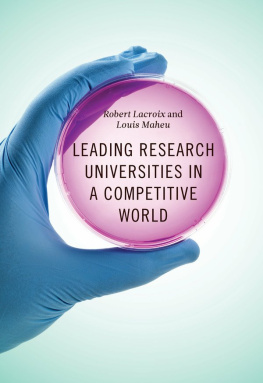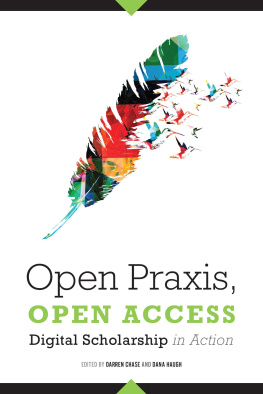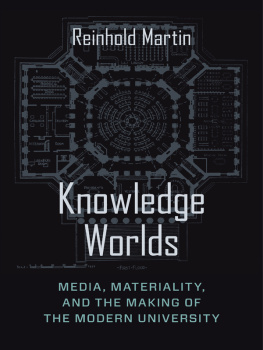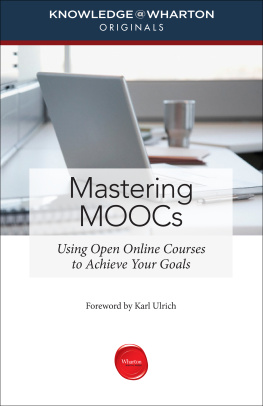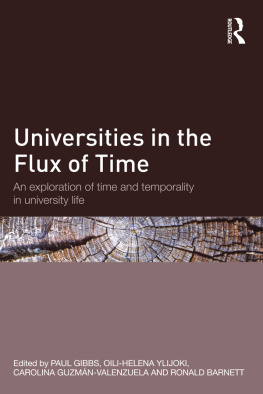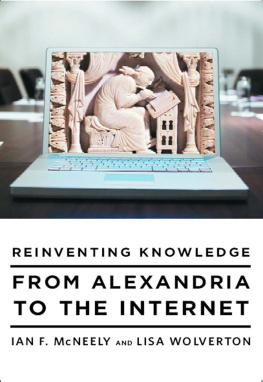Contents
Guide
Pagebreaks of the print version
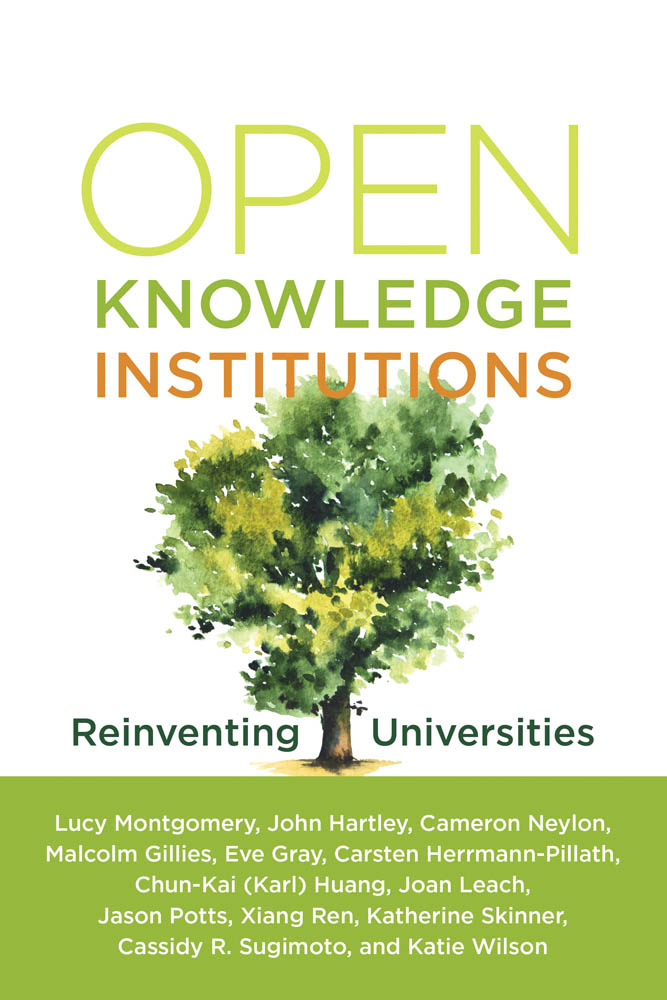
Open Knowledge Institutions
Reinventing Universities
Lucy Montgomery, John Hartley, Cameron Neylon, Malcolm Gillies, Eve Gray, Carsten Herrmann-Pillath, Chun-Kai (Karl) Huang, Joan Leach, Jason Potts, Xiang Ren, Katherine Skinner, Cassidy R. Sugimoto, and Katie Wilson
The MIT Press
Cambridge, Massachusetts|London, England
2021 Massachusetts Institute of Technology
This work is subject to a Creative Commons CC BY license. The open access edition of this book was made possible by generous funding from the MIT Libraries. Subject to such license, all rights are reserved.

The MIT Press would like to thank the anonymous peer reviewers who provided comments on drafts of this book. The generous work of academic experts is essential for establishing the authority and quality of our publications. We acknowledge with gratitude the contributions of these otherwise uncredited readers.
Library of Congress Cataloging-in-Publication Data
Names: Montgomery, Lucy, 1980 author.
Title: Open knowledge institutions : reinventing universities / Lucy Montgomery, John Hartley, Cameron Neylon, Malcolm Gillies, Eve Gray, Carsten Herrmann-Pillath, Chun-Kai (Karl) Huang, Joan Leach, Jason Potts, Xiang Ren, Katherine Skinner, Cassidy R. Sugimoto, Katie Wilson.
Description: Cambridge, Massachusetts : The MIT Press, 2021. | Includes bibliographical references and index.
Identifiers: LCCN 2020029454 | ISBN 9780262542432 (paperback)
Subjects: LCSH: Education, Higher--Effect of technological innovations on. | Internet in higher education. | Open learning. | MOOCs (Web-based instruction) | Universities and colleges--Planning.
Classification: LCC LB2395.7 .M654 2021 | DDC 378.1/7344678--dc23
LC record available at https://lccn.loc.gov/2020029454
d_r0
Contents
List of Figures
List of Tables
List of Case Study
Acknowledgments
We would like to thank Curtin University for funding the workshop that has made this book possible. We are especially grateful to Chris Moran, deputy vice-chancellor (research), who took a chance on this novel methodology.
The organizersCameron Neylon, Lucy Montgomery, and John Hartleyare eternally grateful to the workshop participants who willingly submitted to twelve-hour days of writing, and brought ideas, energy, and patience to the process. We are also grateful to Emma de Francisco, who provided an extraordinary level of professional and organizational support, without which the workshopand this bookcould not have happened.
We thank Faith Bosworth and Book Sprints (https://www.booksprints.net/) for skilled facilitation, and the courage and diplomacy to wrangle a diverse and opinionated group of scholars into collective productivity. The Book Sprints remote team for the initial publication included Raewyn Whyte (editor), Henrik van Leeuwen (illustrator), Julien Taquet (book production), and Juan Gutierrez (information technology support).
We enjoyed outstanding hospitality at the Moondyne Convention Centre. The excitement that accompanied the release of each days menu was only matched by the daily encounters with big mobs of kangaroos. Thanks to Chris and Peter Nott.
Finally, the process of converting the output of the Book Sprints into a formally published, open-access scholarly book has been made possible by the vision, commitment, and flexibility of the MIT Press. Our thanks go to Amy Brand, Susan Buckley, and the MIT Press team. They shepherded our manuscript through both an open community peer review process and more traditional closed scholarly review process, and helped to secure the funding needed to make this book available for free under a CC BY license. Our extraordinary privilege in working with this amazing publisher is a reminder of the value of connecting institutions as enablers of open communication.
Preface
The Flight of the Penguin
Allen Lane died in 1970. Shortly before his death, as the founder of Penguin Books, he met with some of Britains leading academics to propose that a consortium of British universities acquire Penguin Books. Penguin published everything from crime thrillers to Penguin Classics, including Pelican (nonfiction), Peregrine (first editions), Puffin (childrens books), and the hardback Allen Lane imprint. By 1970, Penguin was as popular a national institution as the BBC.
Lanes was an early attempt to link two different types of knowledge institutions: popular but serious publishing and learned but modernizing universities. It came to nothing. The university sector at that time was incapable of making use of the popular reach, industrial resources, and global reputation of the firm that had so astoundingly democratized the reading public. The idea of a great publishing venture as a university did not accord with universities self-conception. Indeed, the day after Lanes death, Penguin was sold to another media giant, Pearson; it would later be internationalized as part of Penguin Random House.
In the context of todays debates over control of the systems of scholarly communications and the societal impacts of textbook costs for students, it is clear in hindsight that an opportunity was lost. Universities might have led the transformation of knowledge institutions from closed cloisters to open and globally networked competitors in knowledge services. It took another generation along with the emergence of digital and internet technologies to force that change, eventually making universities an integrated (if specially protected) part of creative, knowledge, and service economies, in which environment they are by no means the dominant players.
In 2012, Pearson withdrew from trade publishing and began the divestiture of Penguin that would be completed by 2017. In January 2018, a distressed Pearson announced yet another cost-cutting venture, including a near-terminal retreat from the field of content production.
So has Lanes dying initiative now come full circle? With universities increasingly focused on funding publishing infrastructures and supporting open educational resources, is there an opportunity to lift the pace in rethinking their embrace of a more open and competitive knowledge role? Could they even be major players in the creative, knowledge, and service economies? What would it take for universities to be ready to take these opportunities in the future?
Introduction
The Moondyne Manifesto
In April 2018, thirteen of us from around Australia and the world gathered, with only the local kangaroos for company, in a secluded venue deep in the Moondyne Valley, an hour or so east of Perth, to think about the future of the university as an open knowledge institution (OKI). This book is the product of that thinking. It represents a consensus view from some distinct perspectivesresearch professors, open knowledge advocates, science communicators, economists, publishers, high-level university administrators, librarians, and otherstoward a diagnosis of what the problem is, and what we might do to fix it.
This book advocates for universities to become OKIs that institutionalize our worlds creative diversity in order to contribute to the stock of common knowledge.


